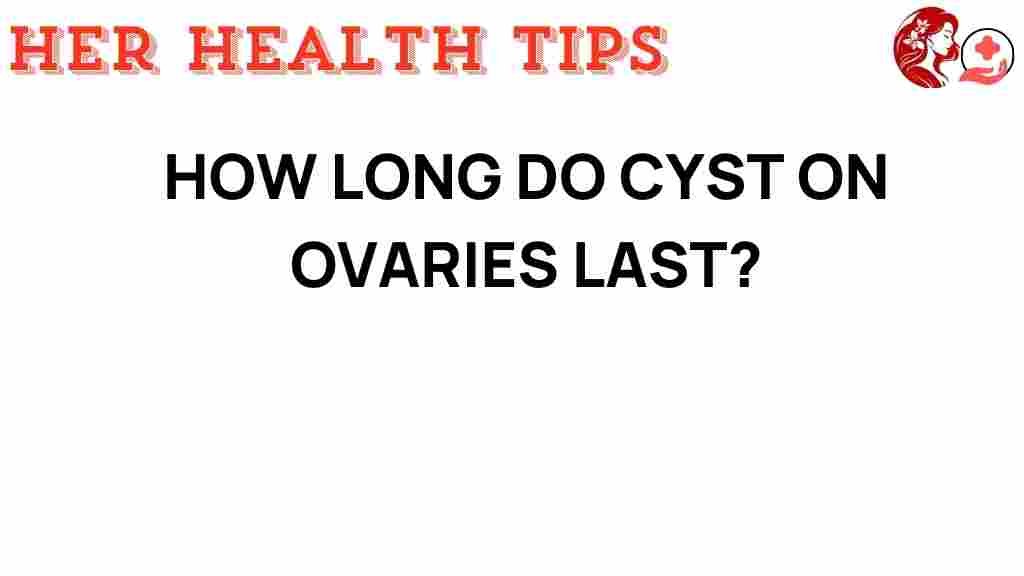Understanding the Lifespan of Ovarian Cysts
Ovarian cysts are fluid-filled sacs that develop on the ovaries, and they are quite common among women of reproductive age. While many women will experience them at some point in their lives, understanding their lifespan, symptoms, treatment options, and management is crucial for maintaining women’s health and reproductive health. This article will delve into the various aspects of ovarian cysts, providing comprehensive information to help you navigate this aspect of women’s health.
What are Ovarian Cysts?
Ovarian cysts are typically benign (non-cancerous) growths that can form on the surface of the ovaries. They are often associated with the menstrual cycle and can vary in size from small to large. Most ovarian cysts are harmless and may resolve on their own without treatment. However, some can cause complications, making it essential for women to be aware of their symptoms and seek proper medical advice.
Types of Ovarian Cysts and Their Lifespan
Understanding the different types of ovarian cysts is crucial, as their lifespan and treatment can vary significantly. The main types include:
- Functional Cysts: These are the most common type and include follicular cysts and corpus luteum cysts. They usually develop during the menstrual cycle and often resolve within a few weeks to a few months.
- Dermoid Cysts: These cysts can contain hair, skin, and even teeth. They typically do not resolve on their own and can persist for years if left untreated.
- Endometriomas: Associated with endometriosis, these cysts can cause chronic pain and may require medical intervention. They can last for several months to years without treatment.
- Cystadenomas: These are benign tumors that can form on the ovary’s surface and may require surgical removal if they grow large.
The lifespan of ovarian cysts varies based on their type and individual health factors. Functional cysts usually resolve on their own, while others may require monitoring or treatment.
Common Symptoms of Ovarian Cysts
Many women with ovarian cysts may not experience any symptoms. However, some may present with the following signs:
- Pelvic pain or discomfort
- Abdominal bloating or swelling
- Changes in menstrual cycle (irregular periods)
- Pain during intercourse
- Difficulty emptying the bladder or frequent urination
- Lower back pain
If you experience severe pain, fever, or vomiting, it’s essential to seek immediate medical attention, as these could be signs of a ruptured cyst or other complications.
Diagnosis of Ovarian Cysts
Diagnosis typically starts with a visit to your healthcare provider, who may perform the following:
- Pelvic Exam: The doctor checks for any abnormalities in the ovaries.
- Ultrasound: An ultrasound is commonly used to visualize the cyst and determine its size and type.
- Blood Tests: Hormonal levels may be checked to rule out other conditions.
Accurate diagnosis is crucial for determining the appropriate management and treatment of ovarian cysts.
Treatment Options for Ovarian Cysts
Treatment for ovarian cysts largely depends on the type of cyst, its size, and the symptoms presented. Options include:
- Watchful Waiting: If the cyst is small and symptom-free, your doctor may recommend monitoring it over time to see if it resolves on its own.
- Medications: Hormonal contraceptives may be prescribed to help regulate your menstrual cycle and prevent the formation of new cysts.
- Surgery: If the cyst is large, persistent, or causing significant symptoms, surgical intervention may be necessary. This can include cystectomy (removal of the cyst) or oophorectomy (removal of the ovary).
Always consult with your healthcare provider for tailored medical advice regarding treatment options.
Managing Ovarian Cysts
Effective management of ovarian cysts is vital for maintaining reproductive health. Here are some tips:
- Regular Check-Ups: Schedule regular gynecological exams to monitor your ovarian health.
- Track Symptoms: Keep a journal of any symptoms you experience, as this can help your doctor make informed decisions about your care.
- Healthy Lifestyle Choices: Maintain a balanced diet, exercise regularly, and manage stress to promote overall health.
- Educate Yourself: Stay informed about ovarian cysts and related conditions to advocate for your health effectively.
When to Seek Medical Advice
While many ovarian cysts are benign and asymptomatic, certain situations warrant immediate medical advice:
- If you experience sudden, severe pelvic or abdominal pain.
- If you have persistent nausea or vomiting.
- If you notice unusual changes in your menstrual cycle.
Early intervention can prevent complications and ensure better outcomes.
Conclusion
Understanding the lifespan of ovarian cysts, their symptoms, and treatment options is essential for every woman. While most ovarian cysts are harmless and may resolve on their own, awareness of their potential impact on women’s health is critical. Regular check-ups, symptom tracking, and maintaining a healthy lifestyle can significantly contribute to effective management and overall reproductive health. If you have concerns about ovarian cysts, consult with your healthcare provider for personalized medical advice and guidance.
For more information on women’s health, consider visiting Women’s Health Resources for valuable insights and support.
Additionally, you can learn more about ovarian cysts and related topics from Healthline.
This article is in the category Reproductive and created by HerHealthTips Team
